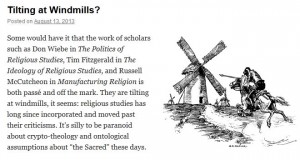 As a native Greek speaker, the words in English that give me most trouble—especially when I find myself at various conferences or lectures in North America that involve, in some way or another, the use of Ancient Greek—is the pronunciation of those words. I admit that I can’t resist the temptation of correction for example whenever I hear Thucydides (pronounced: Thu-si-di-dees) instead of Θουκυδίδης (pronounced: Thu-ky-theē-thees). But once I found myself in an awkward position where context made the text if not unrecognizable but certainly irrelevant. Continue reading ““Hoi Polloi””
As a native Greek speaker, the words in English that give me most trouble—especially when I find myself at various conferences or lectures in North America that involve, in some way or another, the use of Ancient Greek—is the pronunciation of those words. I admit that I can’t resist the temptation of correction for example whenever I hear Thucydides (pronounced: Thu-si-di-dees) instead of Θουκυδίδης (pronounced: Thu-ky-theē-thees). But once I found myself in an awkward position where context made the text if not unrecognizable but certainly irrelevant. Continue reading ““Hoi Polloi””
Studying Religion by Not Studying Religion? Notes from the Field
 This month, I had the honor and privilege of delivering the endowed inaugural Day Lecture (in honor of Zachary Day who was a religious studies major at The University of Alabama before he passed) on religion in popular culture for the Department of Religion where scholar of religion Russell T. McCutcheon is currently Chair. I was struck by and in awe of the intellectual energy there among students who major and minor in religious studies. Not just that they were studying religion, but how they were thinking about the academic study of religion in their own specialties of interest. As someone who has spent the last three years teaching religion on both the undergraduate and graduate levels, and very much interested in the ongoing conversations regarding the “crisis” in the humanities and “decreasing interest” in fields such as religion, it strikes me that getting students to see the utility in and broad possibilities of something like the academic study of religion might rely upon how we as scholars, or departments, for example, demonstrate not so much what religion is but how studying religion might assist in exploring a wide variety of data in the social world – such as claims to identity and difference. The latter, in part, relies upon how we both mark (and market) the academic study of religion, perhaps away from a static and self-evident “thing” (over there) towards a notion of religion as more of an “anthropological enterprise” – a social process – a human doing and making. Continue reading “Studying Religion by Not Studying Religion? Notes from the Field”
This month, I had the honor and privilege of delivering the endowed inaugural Day Lecture (in honor of Zachary Day who was a religious studies major at The University of Alabama before he passed) on religion in popular culture for the Department of Religion where scholar of religion Russell T. McCutcheon is currently Chair. I was struck by and in awe of the intellectual energy there among students who major and minor in religious studies. Not just that they were studying religion, but how they were thinking about the academic study of religion in their own specialties of interest. As someone who has spent the last three years teaching religion on both the undergraduate and graduate levels, and very much interested in the ongoing conversations regarding the “crisis” in the humanities and “decreasing interest” in fields such as religion, it strikes me that getting students to see the utility in and broad possibilities of something like the academic study of religion might rely upon how we as scholars, or departments, for example, demonstrate not so much what religion is but how studying religion might assist in exploring a wide variety of data in the social world – such as claims to identity and difference. The latter, in part, relies upon how we both mark (and market) the academic study of religion, perhaps away from a static and self-evident “thing” (over there) towards a notion of religion as more of an “anthropological enterprise” – a social process – a human doing and making. Continue reading “Studying Religion by Not Studying Religion? Notes from the Field”
On the Spot with Vaia Touna
“On the Spot” backs members of Culture on the Edge into a corner to talk about their backgrounds, their ongoing work, and what might be gained by an alternative understanding of how identity works.

Q: Vaia, you focused some of your scholarship on ancient Greek texts both before and after beginning to read social theory – could you give us an example of how the theorists you’ve read have affected the way that you now approach these ancient materials?
A: My Masters was on Euripides’ tragedy Hippolytus and the notion of Meden Agan (i.e., moderation) and how it was understood in the 5th century BCE Athens. In order to write my thesis back then, of course, I read a lot of secondary literature and commentaries on the play, heavily descriptive works on the “religion” of the ancient world, and of course how ancients might have thought/felt and the universality of their meanings that (we today presume) stay unalterable in their texts—meanings that modern scholars, with the right tools, will be able to retrieve just like the archaeologists dig up and unearth the past. I did all that in my effort to better understand and recreate that ancient world. This approach to the ancient material has changed once I started reading theorists like Russell McCutcheon, Jonathan Z. Smith, Bruce Lincoln, Michel Foucault, and others; now my data are not just these ancient texts (whether literature, or statues, vases, etc.) but also the commentaries that previously served as my “way into” the ancient world, for I came to realize that the world I was entering was the world and time period of those scholars. Continue reading “On the Spot with Vaia Touna”
“And You Shall Call His Name Jesus”
 What’s in a name? Well apparently a whole lot according to one judge in Eastern, Tennessee, Child Support Magistrate Lu Ann Ballew, who not too long ago, ruled (while the parents were in court for not being able to agree on the child’s last name) that a 7-month old baby boy named Messiah, name be changed to “Martin,” arguing that only one person is deserving of such a name and “that one person is Jesus Christ.” The mother of the child, Jaleesa Martin, is appealing the decision. Continue reading ““And You Shall Call His Name Jesus””
What’s in a name? Well apparently a whole lot according to one judge in Eastern, Tennessee, Child Support Magistrate Lu Ann Ballew, who not too long ago, ruled (while the parents were in court for not being able to agree on the child’s last name) that a 7-month old baby boy named Messiah, name be changed to “Martin,” arguing that only one person is deserving of such a name and “that one person is Jesus Christ.” The mother of the child, Jaleesa Martin, is appealing the decision. Continue reading ““And You Shall Call His Name Jesus””
Tilting at Windmills?
 Interested in Craig Martin‘s thoughts on future directions in the sociology of religion — at least why he thinks some others’ thoughts are sadly inadequate? Click here.
Interested in Craig Martin‘s thoughts on future directions in the sociology of religion — at least why he thinks some others’ thoughts are sadly inadequate? Click here.
In Our Heart of Hearts

10. Understanding the system of ideology that operates in one’s own society is made difficult by two factors: (i) one’s consciousness is itself a product of that system, and (ii) the system’s very success renders its operations invisible, since one is so consistently immersed in and bombarded by its products that one comes to mistake them (and the apparatus through which they are produced and disseminated) for nothing other than “nature.” – Bruce Lincoln, “Theses on Method” Continue reading “In Our Heart of Hearts”
Whose Switch is a Switch?
 Code switching is often used to reference the actions (usually linguistic variations) of a particular person/group that is assumed to break from their own “natural” practices to perform codes “not their own” for the purposes of fitting in, acquiring capital, and accessing spaces thought to perceive the “native” practices of the switcher as illegitimate or illegible. This switching, or shifting as some call it, is often painted with a stroke of fluidity and described to take know-how, precision, performance and rehearsal. While the durability or recapitulations of code switching may come to be seen as natural over time, where it’s no longer recognized or described as a switch, it’s often thought to be something that is and can be [consciously] turned off and on like a light switch by the social actor. Continue reading “Whose Switch is a Switch?”
Code switching is often used to reference the actions (usually linguistic variations) of a particular person/group that is assumed to break from their own “natural” practices to perform codes “not their own” for the purposes of fitting in, acquiring capital, and accessing spaces thought to perceive the “native” practices of the switcher as illegitimate or illegible. This switching, or shifting as some call it, is often painted with a stroke of fluidity and described to take know-how, precision, performance and rehearsal. While the durability or recapitulations of code switching may come to be seen as natural over time, where it’s no longer recognized or described as a switch, it’s often thought to be something that is and can be [consciously] turned off and on like a light switch by the social actor. Continue reading “Whose Switch is a Switch?”
